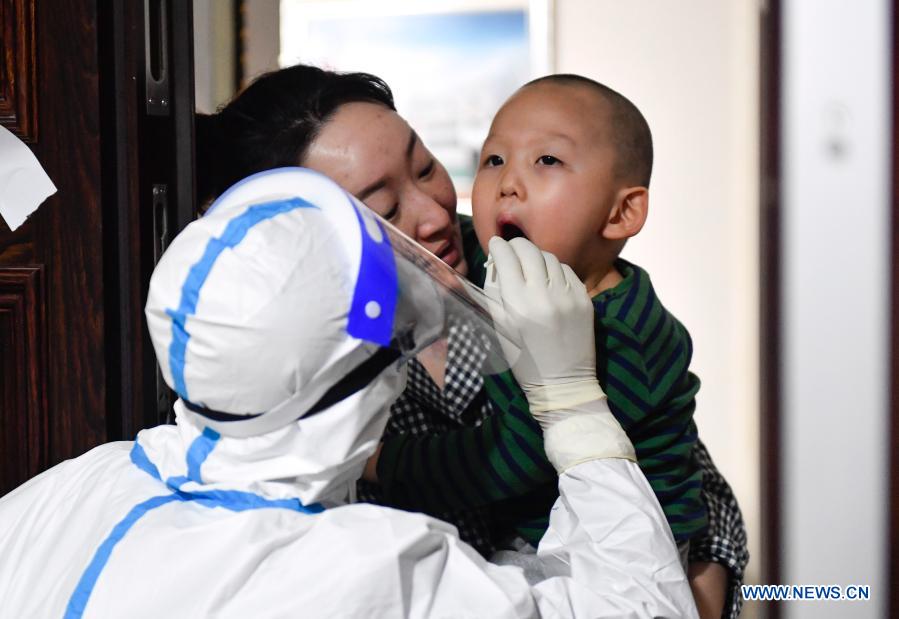Tonghua readies massive COVID quarantine facility
By ZHOU HUIYING in Harbin | CHINA DAILY | Updated: 2021-01-26 06:57

A new quarantine facility with 1,186 rooms is under construction in Tonghua, Jilin province, and is expected to be finished on Wednesday, local authorities said.
Construction on the 48,000-square-meter facility started on Thursday at Tonghua Bonded Logistics Center.
Tonghua has been heavily affected by an outbreak that started on Jan 12, when the first positive COVID-19 case was reported. There were 196 confirmed cases and 50 asymptomatic carriers in the city as of Sunday.
On Monday, Jilin's provincial health commission reported 67 new locally transmitted, confirmed cases on Sunday, 56 of them in Tonghua.
The city has strengthened measures to curb the spread of COVID-19 and improved services supporting its residents in home quarantine.
Over 7,000 people, including government officials, community workers and volunteers, have pitched in to speed up delivery of daily necessities to residents, Tonghua Mayor Li Ping said at a news conference on Monday.
"As of 3 pm on Monday, over 73,000 households in Dongchang district, the only high-risk area in the province, had received packages containing a five-day supply of groceries," he said. "Delivery for the rest of the 33,000 households will be finished by midnight on Monday."
Changchun, Jilin's capital, has had its first two recoveries in the recent outbreak. Those patients were discharged from the hospital on Monday.
As of Sunday, the province had reported 273 confirmed cases and 60 asymptomatic carriers in the recent outbreak.
Neighboring Heilongjiang province reported 35 new local cases and 20 asymptomatic carriers on Sunday, of which 18 confirmed cases and 18 asymptomatic carriers were from Harbin.
Most of the cases were in some way connected to a local food company, Heilongjiang Charoen Pokphand Co, in Harbin. The company was shut down and was screening its workers and products for the virus.
"As of Monday, we have removed more than 1,400 metric tons of their products from the markets and conducted nucleic acid testing," Li Jinsong, deputy director of the provincial administration for market regulation, said on Monday. "Tests of over 91,000 samples were conducted and nine samples from the outer packages tested positive."
A total of 2,434 kilograms of products had gone to markets in a number of cities, including Suihua, but all have been sealed, he said.
In Hebei province, the recent outbreak appeared to decline, with its capital, Shijiazhuang, recording three new local, confirmed cases and one asymptomatic carrier by midday on Monday-a sharp decrease from double-digit increases some days earlier this month.
Recovered patients are required to undergo a 21-day medical observation at a designated hospital before going home, said Jiang Ping, director of the Shijiazhuang Fifth People's Hospital. After returning home, they start a 14-day quarantine, followed by a three-month follow-up by local medical facilities, including taking regular nucleic acid tests.
"These measures aim to follow up on those recovered to ensure their health, in case some test positive again," he said.
In Beijing, mass nucleic acid tests continue, said Tian Tao, an official in the city's COVID-19 control and prevention work leading group.
As of Sunday, the city has tested over 17.46 million samples, he said.
In Daxing district, where the Ronghui community was designated a high-risk area, authorities will allow one member of each family in home quarantine to bring pets to a designated quarantine location where animal quarantine staff can provide related services, starting Monday.
Shanghai reported one new local COVID-19 case on Sunday, bringing the total of new cases to 13, the municipal government said on Monday morning.
Zhang Wenhong, leader of the Shanghai team of experts in the clinical treatment of COVID-19 cases, wrote on his personal Weibo blog on Sunday that Shanghai's COVID-19 pandemic control efforts have always been like "catching mice in a porcelain shop".
"The epidemic prevention and control workers are doing their best to catch the 'mice' while leaving the porcelain intact. They want to cause the least disruption to the residents' daily lives," he wrote.
Du Juan in Beijing, Zhang Yu in Shijiazhuang, Zhou Wenting in Shanghai and in Changchun contributed to this story.
























